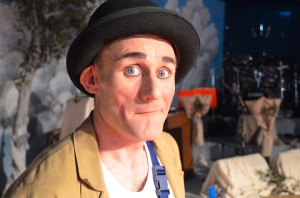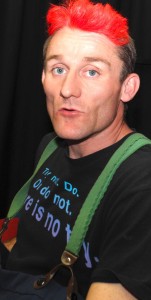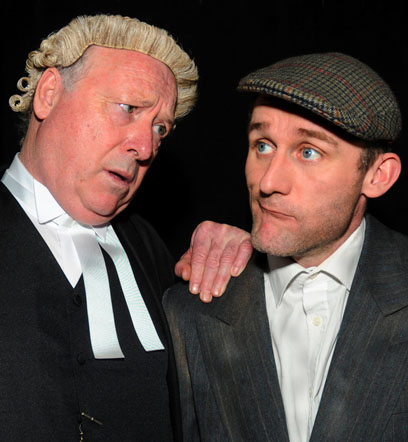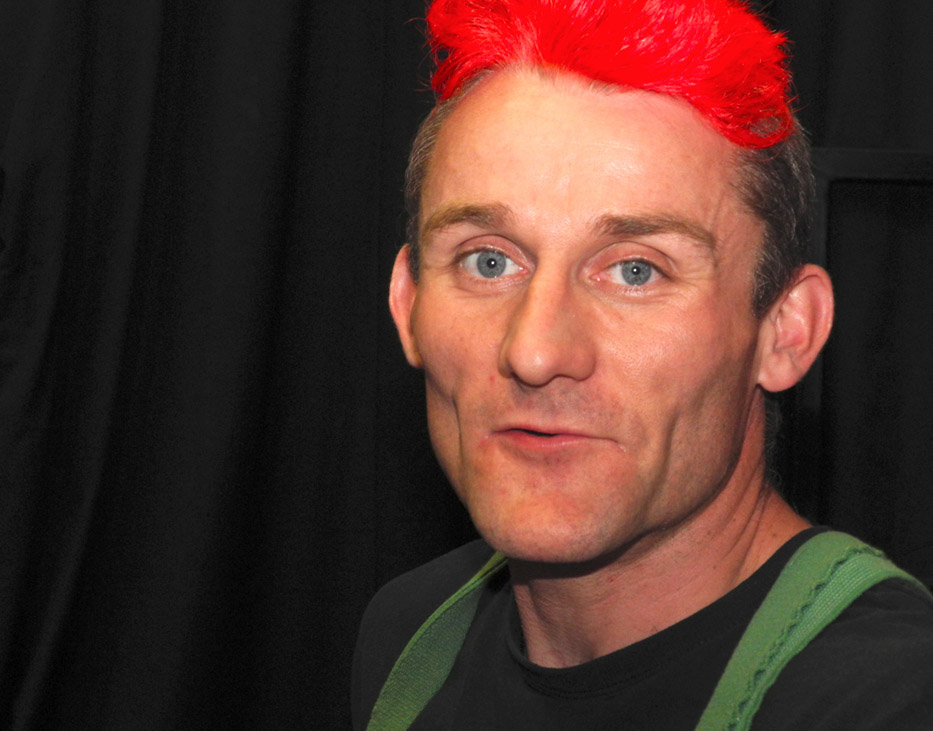Tweedy the Clown, while not yet perhaps a national treasure, is certainly rapidly becoming a regional one. While appearing in this year’s Greek myths themed show at Giffords Circus, he confided in me that he was not one of the Gods, but was trying to be.
Tweedy is one of those rare beings who can raise a smile and a warm glow just at the merest mention of their name. Tweedy, real name Alan Digweed, has established a solid reputation and a loyal following in the west of England over the past ten years or so thanks to appearances at Giffords and, more recently, in pantomimes at the Everyman Theatre, Cheltenham. He has also appeared in many prestigious international shows including the mega-circus of Ringling Brothers and Barnum & Bailey’s in America.
 But Tweedy is not your conventional clown. There are no big boots, no red nose and garish make-up. He keeps it simple with just a bright red quiff of hair and a bit of eye liner. His act/persona is much more akin to the old silent movie stars like Stan Laurel or Buster Keaton or, more recently comedians like Max Wall. Tweedy is funny in his bones. If he was capable of it, seeing him just standing still would be funny.
But Tweedy is not your conventional clown. There are no big boots, no red nose and garish make-up. He keeps it simple with just a bright red quiff of hair and a bit of eye liner. His act/persona is much more akin to the old silent movie stars like Stan Laurel or Buster Keaton or, more recently comedians like Max Wall. Tweedy is funny in his bones. If he was capable of it, seeing him just standing still would be funny.
Tweedy has been a clown for the past twenty years but is now preparing to step out of his comfort zone and try something completely different. In the middle of October he will take on his first acting job, appearing in John Mortimer’s classic poignant comedy The Dock Brief in the Studio of the Everyman Theatre.
Tweedy plays Fowle, a cuckolded husband awaiting trial for murdering his wife. Another Everyman favourite, Mark Hyde who has appeared in the last six pantomimes, plays Fowle’s inept barrister, Morganhall, as they try to piece together the case for the defence in the cells beneath the courtroom.
Tweedy and I had been talking for two or three years about him doing a straight play so I was pleased that he was keen to do The Dock Brief when I suggested it to him.
‘What appealed to me about the play is that although there is the slapstick element, the two characters have similarities to Laurel and Hardy. Fowle is a bit like Stan Laurel in as much as he’s just eager to please the barrister. He’ll go along with whatever this guy says because he wants to please him. That’s a very Stan Laurel trait – whatever Ollie wants to do, Stan will go along with it.’
I suggested that Morganhall, the barrister, is quite protective and patronising, always thinking he knows everything, like Oliver Hardy.
‘Yes, the barrister is very Ollieish. That’s what occurred to me when I first read the play and thought I could see it working. When that suddenly came into my mind I thought yes, they have a similar relationship to Stan and Ollie, which is really nice.’
 Bearing this in mind I hoped that neither of them would be scratching the top of their heads with their finger-tips and saying, “That’s another fine mess you’ve gotten me into”. Tweedy laughs. ‘No, of course I’m not going to be doing an impersonation of Stan Laurel; but it’s that relationship that appealed to me.’
Bearing this in mind I hoped that neither of them would be scratching the top of their heads with their finger-tips and saying, “That’s another fine mess you’ve gotten me into”. Tweedy laughs. ‘No, of course I’m not going to be doing an impersonation of Stan Laurel; but it’s that relationship that appealed to me.’
I wondered what he thought his years of experience as a clown in circus and pantomime could bring to a stage play, albeit a very broad comedy. It is a little hobby-horse of mine that comedians often make very fine straight actors – I’m thinking of Eddie Izzard, Hugh Laurie and Max Wall. What did he think made that so?
He thought for a moment. ‘Well obviously, with the comedy, it’s the timing but I think most comedians look at how people behave; their mannerisms and things like that. Comedy is about observing people and I think that’s one of the key things that can help with creating characters.’ I agreed that observation was the key. Timing is not the sole prerogative of the comedian or clown; it is also an essential tool for an actor or any other performer, come to that.
One of Tweedy’s most recognisable features, his trade mark almost, is his quiff of bright red hair that sits atop his head in an almost TinTin fashion. I broke it to him gently that it would have to go for The Dock Brief. ‘No problem,’ he said warily with only the slightest hint of trepidation in his eye.
I also dropped the bombshell that during rehearsals he would be known as Alan and not Tweedy. He looked worried. ‘I might not respond,’ he laughed and twisted round in his chair, ‘Who’s he talking to..? The only people who don’t call me Tweedy are my bank manager and other men in suits,’ he laughs, ‘and it’s been like that for twenty years.’ But, I pointed out, this isn’t a play with Tweedy in, it’s a play with Alan Digweed. He thought for a moment. ‘In that case I think I’d rather you called me Mr Digweed,’ he says haughtily. ‘Or sir,’ we both say together and start to giggle. After we had calmed ourselves I explained that I thought it would make it easier for him if he was aware at all times that he wasn’t Tweedy. ‘We shall see.’ he said thoughtfully.
We are both very aware that it’s quite a big step for him to go into a play and I asked him what he thought the main problems may be; what would he have to be particularly aware of? ‘One thing I am going to have to be careful of is scenes that are particularly physical or fast paced because when I get excited I automatically go into clown mode, so I think I need to watch that. It’s also not having that safety that I am used to, as a clown, where I can speak directly to the audience. If something goes wrong to a clown, it’s a gift. Even if I forget my words I can turn that around and make it funny, which is great. If I forget my words in this….’ he trailed off, looking pensive.
A lot of actors will talk about breaking down the fourth wall; the invisible wall at the edge of the stage that separates actors and audience. I suggested to Tweedy that his main concern was to establish it. ‘That’s right; I need to build it up. It will be difficult,’ he conceded, ‘it will be much more difficult than any role I go into as Tweedy.’
Tweedy and I have discussed working on a project like this since we met. Initially he told me he would fancy doing a Samuel Beckett play. ‘Yes, I love Beckett stuff and it’s very close to clowning although, having said that, I couldn’t do a Beckett play as Tweedy.’ I agreed and pointed out that one of his heroes, Max Wall, had in fact done Waiting for Godot back in the 1970s. However, I pointed out, in The Dock Brief there is a lot of opportunity for physical comedy. There is a scene where they rehearse what they will do in court and take on various guises such as the judge, the foreman of the jury, a witness and things like that so there is the opportunity to clown around, if you like. Tweedy agreed. ‘It’s definitely a comic play but I shouldn’t morph into to Tweedy at any point. It’s creating believability in the character, not having them thinking that it’s Tweedy trying to be someone else.’
But The Dock Brief is not just a comedy. The play takes place in 1958 when the death penalty was still in force in England so, if Fowle is found guilty, he might well be executed. ‘Absolutely, I think we must always have in the back of our minds the undercurrent of what will happen if things go wrong.’
At the time of writing, more than four weeks before the play opens, The Dock Brief is almost sold out. Assuming our production lives up to expectations and is a great success and Alan Digweed is hailed as the acting sensation of the new age, what would he like to do next? Out of all the scripts that will undoubtedly come tumbling through his letter-box, which would he fancy doing? ‘Well, we’ve already discussed Beckett and I would be interested in playing a Shakespeare clown. I did actually direct some comedy in Shakespeare for Red Shift Theatre. I was asked to play Dogberry in Much Ado About Nothing but our dates didn’t work out so I was asked to direct a couple of comedy scenes in it and that worked out very well. I also helped out a bit on a scene for the television Father Brown series which they filmed at Giffords during the summer. I loved doing it but I don’t think it’s something I want to pursue, I am essentially a performer.’
We were due to start rehearsing in about three week. Was he looking forward to that? ‘I don’t actually enjoy the rehearsal process very much.’ he confided. ‘I like it up to a point but always, about half-way through, I just want to be doing it. I suppose it depends on how long the rehearsal period is as well.’ I point out to him that we have a relatively short time because of his other commitments. ‘Umm, I don’t think I’ll be bored then.’ he said with a slightly worried look on his face. He said he hoped to be word-perfect before rehearsals started and he was used to learning difficult text for the pantomimes, so he wasn’t worried. I couldn’t help noticing that his fingers were crossed as he spoke.
Alan ‘Tweedy’ Digweed was talking to Michael Hasted who is producing and directing John Mortimer’s The Dock Brief at the Everyman Studio from 14th October.
CLICK HERE to visit the production’s website with photos, videos and much more
Text and photos © Michael Hasted 2014. No reproduction in whole or in part without specific permission.
An edited version of this interview first published in October 2014 edition of THE CHELTONIAN
The producer gratefully acknowledges support from
THE OLDHAM FOUNDATION
and




